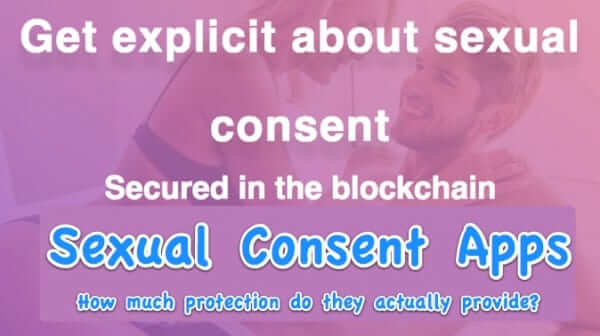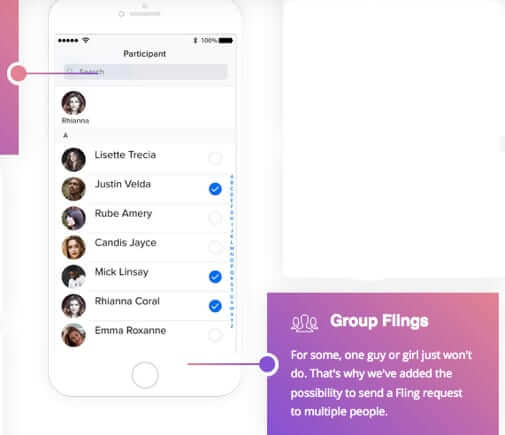
As men and women across the country (and around the world) struggle to both upgrade the definition of ‘consent’ and to understand the new paradigms, it seems only natural that app makers would get into the game. Sexual consent apps such as We-Consent, SaSie (Safe and Secure intimate encounters) and LegalFling have all thrown their hats (and whatever other clothing) into the ring to be your assurance that consent to intimate encounters goes recorded.
First, let’s face it, these are to protect men by recording that the woman (or other man) actually consented. (Women are by far the majority of those who level accusations of sexual assault, and also men almost never report when they are sexually aggressed by women.)
No app can protect you as well as being smart about your hookups.
While these apps are primarily trying to cash in on the huge sucking void of logic created by Title IX (the sexual assault on campuses frenzy), they of course can be used by anyone, not just students.
But how much protection do they actually afford to either party?
The Sexual Consent App Lineup
At present, there are three apps vying for your sexual consent business: We-Consent, SaSie, and Legal Fling.
The Internet Patrol is completely free, and reader-supported. Your tips via CashApp, Venmo, or Paypal are appreciated! Receipts will come from ISIPP.
All three of them operate on the same premise – namely that they are giving you the opportunity to record each of your consent to an intimate (i.e. sexual) encounter with the other.
Legal Fling may be the most technically interesting of the three, as it touts its use of blockchain (everything is sexier with blockchain – no pun intended).
Legal Fling is all about creating a contract between the two consenting parties, so that if one of them breaches the contract, they can present it as evidence in court. As Legal Fling founder Arnold Daniels explained to USA Today, “[E]ach partner will “clearly see your do’s and don’ts without having to voice them.” Click ‘agree’ … you’ll have entered a legally binding contract, with an encrypted transaction stamp verifiable using blockchain technology.” Then, he goes on to say, if one of you breaches the contract by not using a condom, for example, you could end up in court with a breach of contract lawsuit.
It should be noted that legal experts – including this author, who has considerable background in these issues – doubt that the court would actually let the app be entered into evidence, let alone give it any significant weight.
Legal Fling also is the only one of the apps to contemplate group sex situations, although we should note that things get considerably stickier the more people you add (legally stickier, get your minds out of the gutter).

Meanwhile, SaSie explains that “SaSie is a binding agreement which compells (sic – and can you really trust your freedom to an app that can’t even get basic spelling right on their home page?) two students to conduct an intimate relationship in a manner which is compliant with affirmative consent policies on many campuses in the United States. This app does NOT preemptively grant consent. (No app can or should do that.)”
We Consent comes with an added bonus: the ‘[Page no longer available – we have linked to the archive.org version instead]‘ app (yes, that’s what it’s actually called). This app is for those times when you were, well, violated, regardless of the fact that you may have previously consented in the We Consent app.
Says We Consent of the I’ve Been Violated app, “Turn on the app and begin to tell your story by following the on-screen instructions. The app will prompt you on what to say while recording audio and video.”
Gosh, that’s not at all concerning.
And this brings us to the issue of whether these apps will actually help, let alone hold up in court. Because here’s the thing: what about situations where you grant consent through the app, and then verbally withdraw consent afterwards? Or the situation where neither ever withdrew consent, but gets buyer’s remorse afterwards, or wants to retaliate for being jilted, and engages in revisionist history?
In fact, not only do these apps not contemplate or facilitate the withdrawing of consent, but they actually could – if allowed in court – be used to demonstrate that consent was there when in fact it wasn’t because it had been verbally withdrawn after consenting through the app.
In the end, it all still comes back to a he said/she said situation.
Which means that he and she both need to be very clear in their intentions, in what they communicate, and in how they listen. No app can protect you as well as being smart about your hookups.
The Internet Patrol is completely free, and reader-supported. Your tips via CashApp, Venmo, or Paypal are appreciated! Receipts will come from ISIPP.










